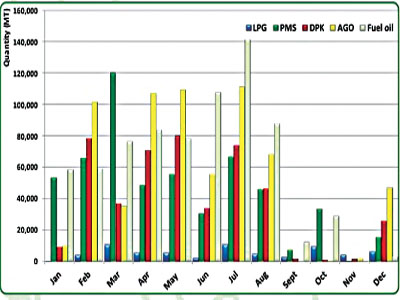 THE United States Energy Information Administration (EIA) has estimated that global consumption of petroleum and other liquids to grow by 1.3 million bpd in 2015 and by 1.4 million bpd in 2016.
THE United States Energy Information Administration (EIA) has estimated that global consumption of petroleum and other liquids to grow by 1.3 million bpd in 2015 and by 1.4 million bpd in 2016.
In its short term energy report released last week, global consumption of petroleum and other liquids will grow by 1.1 million bpd in 2014, averaging 92.4 million bpd for the year.
According to the agency, consumption of petroleum and other liquids outside Organization for Economic Cooperation and Development (OECD) countries grew by 1.4 million bpd in 2014 and is projected to grow by 0.8 million b/d in 2015 and by 1.1 million bpd in 2016.
It added that lower forecast growth for non-OECD consumption in 2015 mostly reflects a 0.2 million b/d decline in Russia’s consumption as a result of the country’s economic downturn.
EIA estimates that non-OPEC petroleum and other liquids production grew by 2.3 million bpd in 2014, which mainly reflects production growth in the United States.
EIA estimates that OPEC crude oil production averaged 30.1 million bpd in 2014, unchanged from the previous year. “Crude oil production declines in Libya, Angola, Algeria, and Kuwait offset production growth in Iraq and Iran. EIA forecasts OPEC crude oil production to increase by 0.6 million b/d in 2015 and decrease by 0.2 million bpd in 2016. Iraq is expected to be the largest contributor to OPEC production growth in 2015. At the OPEC meeting on June 5, the group did not change its 30 million bpd crude oil production target. EIA forecasts OPEC crude oil production will continue to e xceed that target over the forecast period, contributing to expected global inventory builds”, it added.
xceed that target over the forecast period, contributing to expected global inventory builds”, it added.
The EIA explained that Iran and the five permanent members of the United Nations Security Council plus Germany reached a framework agreement to guide negotiations targeting a comprehensive agreement. “Negotiations continued beyond the June 30 target, and July 7 was agreed as the new target date for a comprehensive agreement. However, no agreement had been reached by the time of this writing. A comprehensive agreement could result in the lifting of oil-related sanctions against Iran and a subsequent increase in Iran’s crude oil production and exports, although the timing and details of any suspension of sanctions are uncertain.



